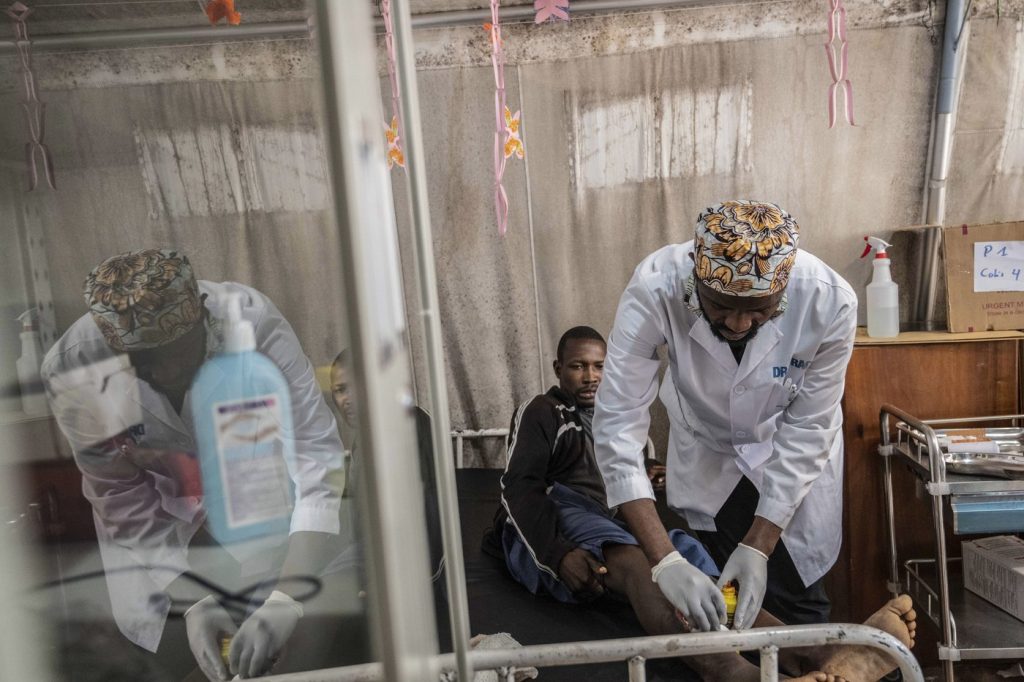GOMA, Congo (AP) – In Goma, a city in eastern Congo that is home to approximately 2 million residents, hundreds of wounded individuals have flooded into hospitals, which are now severely overcrowded due to ongoing violence. Government forces are engaged in fierce clashes with Rwanda-backed M23 rebels. Nursing staff at Bethesda Hospital report that patients are arriving with serious injuries as the medical facility struggles to keep up with demand. Florence Douet, an operating room nurse, expressed concern, stating, "They will get infected before we can treat them all."
Since the M23 rebels launched their offensive on Goma on January 26, there have been significant casualties. Official figures indicate more than 700 fatalities and nearly 3,000 injuries in and around the city. Bethesda Hospital alone is admitting over 100 new patients daily, overwhelming its 250-bed capacity. Many other hospitals in Goma face similar situations, with inadequate medical supplies and staff available to treat the influx of patients.
The healthcare system in Goma becomes even more strained as the city is currently hosting about 6.5 million people displaced by ongoing conflict, creating one of the largest humanitarian crises in the world. Patients arriving with gunshot wounds are forced to share beds, while others lie on the floor in urgent need of medical attention. Patrick Bagamuhunda, a patient injured in the conflict, remarked, “This is the first time I’m experiencing this. This war has caused a lot of damage, but at least we are still breathing.”
The situation escalated due to the M23 rebels, who now reportedly have around 4,000 troops from Rwanda backing them, a significant increase from their initial capture of Goma in 2012. The rebels have announced their intentions to advance towards Congo's capital, Kinshasa, asserting that the country is a failed state under President Félix Tshisekedi. The conflict is rooted in a decades-old ethnic struggle, with M23 claiming to protect ethnic Tutsis, who are alleged to be persecuted by Hutu militias linked to the 1994 Rwandan genocide.
Hospitals like Kyeshero are also overwhelmed with the number of patients requiring treatment for bullet wounds. Surgeon Johnny Kasangati reported removing 48 bullets in one day as he treated patients under makeshift tents amid the crisis. Kyeshero's capacity has surpassed 200% on certain days, according to project coordinator Joseph Amadomon Sagara from Doctors Without Borders. Historically, hospitals in Goma were able to transport patients to Bukavu via boat; however, this method has been halted due to the rebellion and damaged infrastructure. The ongoing fighting has disrupted supply chains, leading to severe shortages in medical supplies essential for aid groups.
The government of Congo has verified 773 deaths related to the conflict and noted that the true toll might exceed this figure due to concerns over potential mass graves. The Maternité de la Charité Hospital has struggled to manage the number of deceased individuals, with medical director Jules Kafitiye revealing that they were compelled to transfer 56 bodies to a provincial hospital with more morgue space.
With bodies accumulating on streets and in hospitals, fears of disease outbreaks are rising. The region is currently experiencing various health crises, including mpox and cholera, with the World Health Organization warning that recurrent mass displacements create favorable conditions for endemic diseases. As significant shortages in medical supplies persist, aid organizations are left scrambling with dwindling stockpiles, further complicating the healthcare response in Goma amidst the violence.










